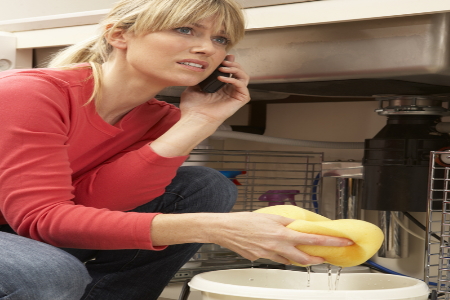How to Avoid Plumbing Emergencies

Plumbing emergencies due to broken or leaky pipes, clogged drains, overflowing toilets, and broken water heaters are stressful and costly, especially if you have an emergency at night or on a weekend or holiday. Take care of your plumbing to prevent expensive emergency repairs.
Take Care of Your Drains
You can avoid most drain clogs by taking care of them properly. Dump cooking grease and fat in the trash instead of down the drain so it does not harden and clog the pipes under your kitchen sink.
Do not put food debris down the drain unless you have a garbage disposal. If you do have a disposal, run cold water before you turn it on and do not put food in the disposal until it is running. Keep the water running for about 15 seconds after you are finished using the garbage disposal to move the ground-up debris through the pipes into your sewer system.
Keep stringy and fibrous foods, such as chicken skin, celery, and potato peels, out of your disposal since they are harder for your system to grind up adequately.
Keep hair out of your bathroom drains by placing a strainer over the drain to catch strands of hair and other particles.
Watch What You Flush
Clogged and overflowing toilets are common plumbing emergencies you can avoid if you are cautious about what you flush. Flush your toilet after every use to prevent waste and toilet paper from building up and clogging. Choose thinner toilet paper if your toilet has a weak flush or you have to use a plunger frequently.
Do not flush anything other than bodily waste and toilet paper — food, menstrual products, and wet wipes should go in the trash. Even wet wipes labeled flushable can cause clogs if they catch on something inside the pipe, so keep a trash can next to the toilet to put used wipes in.
Be Cautious With Chemicals
Avoid using too many chemicals on your toilets, sinks, and showers. Clean with baking soda and vinegar to avoid damage to your drains and pipes. If you have a stopped-up drain, pour baking soda and vinegar down the drain to help loosen clogs or use an eco-friendly drain cleaner.
Most chemical drain cleaners are so harsh they can damage the inside of your pipes if you use them often.
Protect Your Pipes
Frozen pipes can lead to hundreds or thousands of dollars in emergency repairs. Check your pipes for insulation before the weather gets too cold. Consider adding heat tape to your pipes if you live in a mobile home with pipes underneath.
When the weather gets extremely cold, keep the bathroom and kitchen cabinets under your sinks open to let heat in and run your faucets on a slow trickle of cold water to keep water flowing and prevent it from freezing inside the pipes.
Know Your Plumbing Layout
Know where your pipes are. Find your main water shutoff valve, and make sure every adult in the house knows where it is and how to turn it off.
Schedule Regular Maintenance and Professional Repairs
Schedule professional maintenance regularly to avoid surprise emergency repairs. An experienced plumber can locate damaged pipes, hoses, and outdated appliances, such as water heaters, before they cause a major problem.
When you do need a plumbing repair, do not attempt to fix it yourself. You could cause more damage if you are not sure exactly what to do, so leave plumbing issues to the professionals.
Mitchell Plumbing, Heating and Cooling serves homeowners in Pittsburgh, Pennsylvania, and the surrounding areas. Contact us today to schedule an appointment online or over the phone.
Save With Our Preferred Customer Program
With our Preferred Customer Program, you can enjoy exclusive savings and benefits while keeping your home’s plumbing and HVAC systems running smoothly. Members of our Preferred Customer Program gain access to special offers and promotions throughout the year, making it easier and more affordable to keep your home comfortable. Whether it's seasonal HVAC tune-ups or plumbing inspections, you'll save time and money with our program. Sign up today and start enjoying the peace of mind that comes with being a preferred customer!
Learn More About Preferred Customer Program